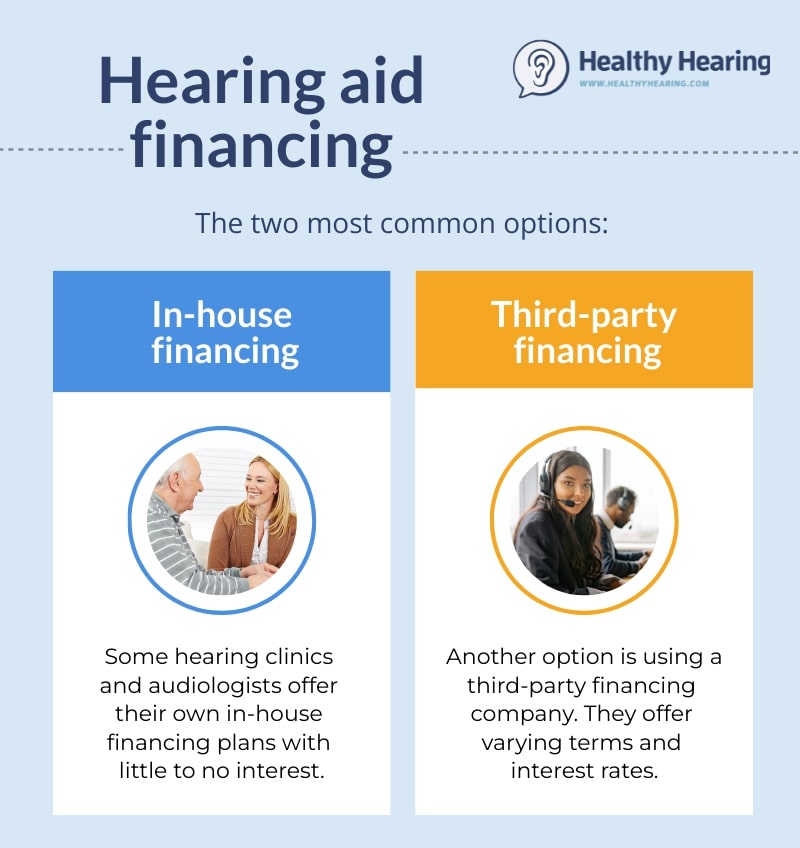|
www.HealthyHearing.com |
Hearing aid financingHow to purchase the hearing devices you need
Contributed by Linda Childers Hearing aids transform lives, reconnecting millions of people with hearing loss to the world around them. Yet with hearing aid prices averaging $2,000 to $3,000 per ear, they can feel out of reach for those on a fixed income or without sufficient insurance. If affording a hearing aid feels like a challenge, financing options might offer the solution you need. What is hearing aid financing?Financing hearing aids allows you to spread the cost of the devices over time instead of paying the full amount up-front. It provides a way to purchase hearing devices if you don’t have sufficient insurance coverage or can’t afford the upfront cost. Before choosing a financing plan, it’s important to review the terms, including interest rates and repayment schedules, to ensure it fits your budget.
Why is it sometimes necessary?Hearing aids come with a high price point. Unlike over-the-counter devices, prescription hearing aids are tailored to fit you perfectly, packed with advanced technology, and backed by ongoing professional care. The cost usually covers more than just the device, including audiologist consultations, follow-up adjustments, and warranties. Many modern hearing aids also feature state-of-the-art innovations, like Bluetooth connectivity, noise reduction, and rechargeable batteries, all of which contribute to their higher price. To help patients pay for their devices, "some audiology clinics work with specific companies that offer medical financing options for hearing aids,” says Bria Collins, Au.D, CCC-A, Associate Director, Audiology Practices for the American Speech-Language-Hearing Association (ASHA) in Rockville, Md. “The plans vary greatly as far as the maximum amount the patient can borrow, the time period to pay back the loan, and the interest rate offered.” How to get startedStart by asking your audiologist if they offer financing and what company they partner with. After choosing a company, you can usually apply for financing directly on their website, in the same way you’d apply for a credit card or auto loan. Credit scores matter“Your credit score and financial standing will impact if you qualify for hearing aid financing," Collins says. "Different financial programs have different parameters to determine eligibility." She notes that many, if not all, of these programs run credit checks. If you have bad credit, it can be more challenging, but not impossible, to secure financing. Adding a friend or family member as a cosigner can improve your chances of being approved if you have bad credit. “Programs that may allow financing for those with low credit scores are likely charging a high interest rate,” Collins says adding that if you go this route, make sure the amount you choose to finance doesn’t exceed the cost of the actual hearing aids. Making payments: What to knowCollins encourages patients to ask about monthly payments and how long it will take to pay off the loan. “Many financial institutions offer 6-, 12-, 18- or 24-months payment plans, some may offer longer financing options,” she says. “I recommend patients explore options that are available to them locally that could help offset the cost of hearing aids before exploring financing options, especially if there are concerns with not being able to afford monthly payments.” In-house financing may be better optionSome audiology practices offer their own in-house financing plans that allow you to spread payments over a set period, often with little to no interest. Melissa Heche, AuD, of New York Speech and Hearing, offers in-house financing to patients at her New York City practice. “With a private in-house financing program, patients bypass bank approval, however a certain amount must be paid before they can take the hearing aids home,” Heche says. She explains that patients put down a specific amount of money as a deposit, sign an agreement, and then a monthly fee is automatically taken from their bank account or charged to a credit card that’s kept on file. Patients are not charged interest. Third-party financing: Some top options
“I always tell my patients that if they choose third-party financing, to remember it’s interest free as long as you pay it off within that specific period of time,” Heche says. “You can't just pay your minimum payment, because it becomes a balloon account, and after 12 months, if you haven't paid in full, it will be assessed, say, at a 29% interest rate, and then it's hard to catch up.” If financing isn’t an option, The National Council on Aging and the Hearing Loss Association of America also provide lists of discount programs for hearing aids and financial assistance. |
Featured clinics near me
Earzlink Hearing Care - Reynoldsburg
7668 Slate Ridge Blvd
Reynoldsburg, OH 43068

Find a clinic
We have more hearing clinic reviews than any other site!


